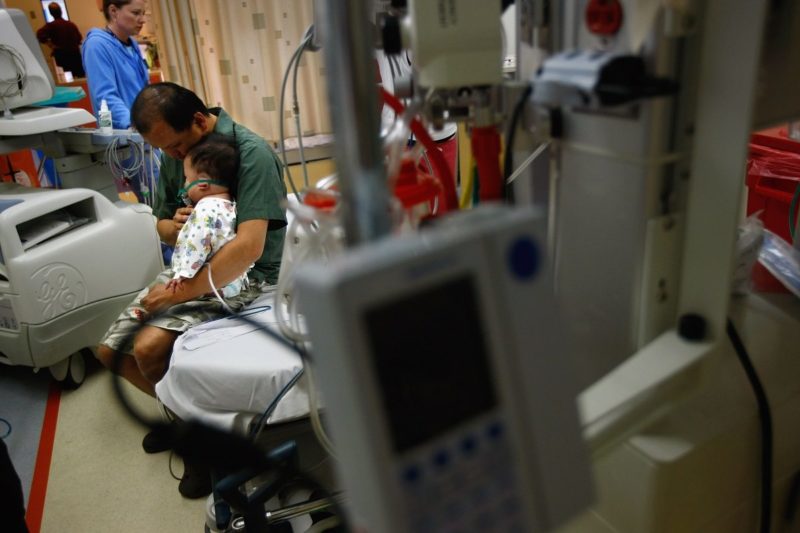Ohio Parents Working Multiple Jobs Still Can’t Afford Care Without CHIP
"These families work extremely hard, and on top of that, are dealing with the pressure of providing for a loved one who is ill. Laziness is not a factor in these family's lives—they are just trying to survive.”

On September 30, funding expires for the Children’s Health Insurance Program (CHIP), and Congress must decide whether and how much to continue supporting the program. This budget decision has added weight this year because of the GOP-controlled government’s proposals to slash federal spending on public programs, including Medicaid. Signed into law as part of the Balanced Budget Act of 1997, CHIP allowed millions of children without health insurance to gain coverage thanks to income requirements assisting families earning above the eligibility range for Medicaid.
Funding cuts or delays would leave the states that offer health care by combining CHIP and Medicaid and the states that operate CHIP separately struggling to provide well-child, well-baby, dental, and emergency services to millions of children. Appalachia is especially at risk; Ohio, North Carolina, Virginia, West Virginia, and Kentucky are states projected to exhaust CHIP funding by 2018.
Among those who would be directly affected by the budget cuts are the three young children of Crystal Lett from Columbus, Ohio, including her 6-year-old son, Noble, who was born with a rare genetic disorder called Prader-Willi syndrome (PWS). PWS “results in low muscle tone, global developmental delays, and an insatiable appetite,” Lett explained to Rewire. Treatment requires occupational, speech, and physical therapies along with daily injections of Human Growth Hormone. “Even with a clean bill of health thus far,” Lett said, “the costs associated with his care are massive.”
Both and Lett and her husband work and have always worked—Lett currently works two jobs—but rely on CHIP “due to the failure of health insurance companies to provide adequate benefits to working families that address both simple and complex medical conditions,” Lett explained. “We pay an exorbitant amount of money to these companies and yet still are not able to access and afford the care that we need.”
Lett said, before CHIP: “if you add[ed] up the cost of our premiums, out-of-pocket maximum, and not-covered therapies, we were spending approximately $53,000 a year on health care—and quite honestly, that estimate is wildly conservative. That price is not sustainable for a young, middle class, family with young kids—even with dual income.”
That’s especially true southeast of Columbus in Athens, the poorest county in Ohio. In a state with 88 counties, Athens County had the 16th highest percentage of children covered by Medicaid and CHIP; 40 percent of Athens County children received coverage from 2011 to 2015.
Athens is small and rural, tucked away in the Appalachian foothills, with brick streets, hiking paths, and a state university: Ohio University. But the county faces a range of problems, among them: unemployment, underemployment, and low-paying, low-benefit jobs. Many jobs operate seasonally, with some of the town shutting down in the summertime, when the university students leave.
Melissa Wales, executive director of United Campus Ministry and Athens resident since 1998, said her region needs CHIP because “most jobs are part-time, service positions without health insurance.” There simply isn’t enough work—and the jobs that exist don’t come with benefits such as employer-sponsored health insurance.
Lett said, “I think one of the things that has been propagated ad nauseam about Medicaid or CHIP recipients is that the people receiving the benefits are not working or are lazy …. This is just not the case. Many families relying on CHIP do so because they have a child with an illness or medical complication that results in increased health care costs. These families work extremely hard, and on top of that, are dealing with the pressure of providing for a loved one who is ill. Laziness is not a factor in these family’s lives—they are just trying to survive.”
Families in Athens have a hard time accessing care, let alone affording it, Wales said. “Lack of transportation in our mostly rural area, centralization of health clinics and hospitals . are all barriers for children and families in our region.”
Combined with lack of affordable care in places like Athens, there is urgent need. Wales also spoke to the high rates of diabetes and cancer in her community, and the difficulty of finding fresh, healthy food. The cost of transportation to health-care providers—sometime a great distance away—adds to parents’ worries, as does the fear that they may not be able to pay for treatment for their children, especially for chronic conditions.
Before CHIP, the Lett family paid “almost $1,000 a month in health insurance premiums. On top of that, our deductible was $12,500 and our out-of-pocket maximum for the year was $15,000. We would hit our our-of-pocket max before the year was even half over.”
Noble, Lett’s son, is doing well now, thanks to regular therapies and medication, treatment the family couldn’t afford without CHIP.
CHIP provides health care for 9 million children nationwide and in conjunction with Medicaid provides coverage for more than half of families of color.
Lett said: “If Congress were to discontinue funding for CHIP, many families, like ours, would find themselves making choices between selling their homes or providing their children with the therapy/medical services they need in order to thrive. That is not a choice any parent should ever have to make.”

